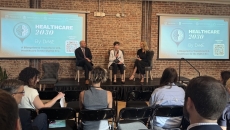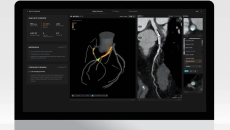Public Policy
At Healthcare 2030, panelists highlighted successful programs at the VA and other government agencies that included integrating digital tools like remote monitoring and AI scribes.
At Healthcare 2030 in Washington, D.C., panelists highlighted debated challenges around interoperability, FHIR adoption and the need for industry-wide standards.
As tariffs target medical devices, plastics and packaging, ArcheHealth CEO Ralph Keiser says technologies that analyze pricing data can help hospitals build evidence for renegotiating contracts and increasing reimbursement.
At an event in Washington, D.C., on Monday, DiMe released a thesis with what it says are four impact areas that are vital to pursue in digital medicine in the next five years.
The offering projects real-time 3D visuals of screw placement into a surgeon's field of view to improve accuracy in spine surgery.
Dr. Erik Langhoff, chief medical officer and consultant for the Bronx Regional Health Information Organization, discusses how the agency is addressing safety and efficacy in AI.
Also, a project developing AI for early periodontal disease detection has received over $1 million in grant funding from the Australian government.
Smile Digital Health will integrate MCG Path, a FHIR-based application programming interface offering, with Smile's CMS Suite.
While shorter-term fixes like renegotiating payer contracts can help, Wipfli's Kelly Arduino recommends that hospitals heavily dependent on Medicaid rebuild community philanthropy and endowments.
Dr. Doug Fridsma, former ONC chief science officer and current chief medical informatics officer at Health Universe, discusses GPT-5, including HIPAA compliance, FDA oversight and potential risks for patients uploading healthcare data.








